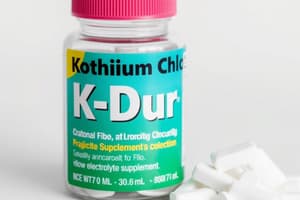Podcast
Questions and Answers
What is the therapeutic class of Potassium Chloride?
What is the therapeutic class of Potassium Chloride?
- Antacid
- Analgesic
- Drug for hypokalemia (correct)
- Diuretic
What is the pharmacologic class of Potassium Chloride?
What is the pharmacologic class of Potassium Chloride?
- Antidepressant
- Electrolyte, potassium supplement (correct)
- Antibiotic
- Corticosteroid
What are some actions and uses of Potassium Chloride?
What are some actions and uses of Potassium Chloride?
Potassium chloride is used for preventing or treating hypokalemia and mild forms of alkalosis.
Potassium Chloride can be crushed before administration.
Potassium Chloride can be crushed before administration.
What are common adverse effects of Potassium Chloride?
What are common adverse effects of Potassium Chloride?
Potassium Chloride is contraindicated in patients with hyperkalemia.
Potassium Chloride is contraindicated in patients with hyperkalemia.
What interactions should be considered when prescribing Potassium Chloride?
What interactions should be considered when prescribing Potassium Chloride?
How does Potassium Chloride affect lab tests?
How does Potassium Chloride affect lab tests?
What is a treatment method for suspected overdose of Potassium Chloride?
What is a treatment method for suspected overdose of Potassium Chloride?
Flashcards
What is Potassium Chloride (KCl)?
What is Potassium Chloride (KCl)?
Potassium Chloride (KCl) is a medication primarily used to treat low potassium levels in the body (hypokalemia). It is classified as an electrolyte and potassium supplement, meaning it replenishes the body's potassium stores.
How is Potassium Chloride administered?
How is Potassium Chloride administered?
Potassium Chloride can be administered orally or intravenously. Oral forms are preferred for preventing or treating mild hypokalemia, while IV administration is reserved for severe cases and certain conditions.
What are important safety considerations for Potassium Chloride?
What are important safety considerations for Potassium Chloride?
While Potassium Chloride is generally safe when administered correctly, certain precautions must be taken to avoid complications. For example, oral forms should be diluted with water to prevent irritation, and IV administration should be slow to prevent cardiac issues.
How does Potassium Chloride interact with diuretics?
How does Potassium Chloride interact with diuretics?
Signup and view all the flashcards
What are common side effects of Potassium Chloride?
What are common side effects of Potassium Chloride?
Signup and view all the flashcards
When is Potassium Chloride contraindicated?
When is Potassium Chloride contraindicated?
Signup and view all the flashcards
What drug interactions should be considered with Potassium Chloride?
What drug interactions should be considered with Potassium Chloride?
Signup and view all the flashcards
How is Potassium Chloride overdose treated?
How is Potassium Chloride overdose treated?
Signup and view all the flashcards
Why is monitoring potassium levels important when taking Potassium Chloride?
Why is monitoring potassium levels important when taking Potassium Chloride?
Signup and view all the flashcards
Study Notes
Potassium Chloride (KCl) Overview
- Therapeutic class: drug for hypokalemia; treats low potassium levels in the body.
- Pharmacologic class: classified as an electrolyte and potassium supplement.
Actions and Uses
- Preferred for preventing or treating hypokalemia; also used for mild alkalosis.
- Available in various forms: tablets, powders, and flavored liquids.
- Should be diluted with water to prevent gastrointestinal irritation; risk of peptic ulcers.
- IV administration must be slow; bolus injections can cause cardiac arrest.
- Commonly prescribed with loop or thiazide diuretics to prevent potassium depletion.
Administration Alerts
- Administer oral forms while patient is upright to avoid esophagitis.
- Do not crush or chew tablets; dilute liquid forms before oral or nasogastric administration.
- IV potassium should not exceed 10 mEq/h; care needed to prevent extravasation.
- Classified as pregnancy category A.
Adverse Effects
- Common side effects include nausea and vomiting due to GI irritation.
- Can be taken with meals or antacids to reduce gastric distress.
- IV use may result in phlebitis and venous irritation; use larger vessels to minimize risks.
- Serious risks include hyperkalemia, especially if taken with potassium-sparing diuretics.
- Chronic kidney disease (CKD) can exacerbate hyperkalemia risk, as kidneys excrete over 90% of potassium.
Contraindications
- Contraindicated in cases of hyperkalemia, CKD, systemic acidosis, severe dehydration, extensive tissue breakdown, adrenal insufficiency, and use of potassium-sparing diuretics.
Drug-Drug Interactions
- Interactions increase hyperkalemia risk when taken with potassium-sparing diuretics and angiotensin-converting enzyme (ACE) inhibitors.
Lab Tests
- Increases serum potassium levels; monitor levels to prevent complications.
Treatment of Overdose
- Withhold potassium-sparing diuretics and potassium-rich foods/medications.
- Administer IV dextrose solution with regular insulin to lower potassium levels.
- Sodium bicarbonate may be given to correct acidosis.
- Use polystyrene sulfonate or patiromer to enhance potassium elimination.
Studying That Suits You
Use AI to generate personalized quizzes and flashcards to suit your learning preferences.
Description
Test your knowledge on Potassium Chloride with these flashcards. Each card covers important aspects like therapeutic class, pharmacologic class, and actions and uses of KCl. Perfect for students studying pharmacology or related medical fields.




